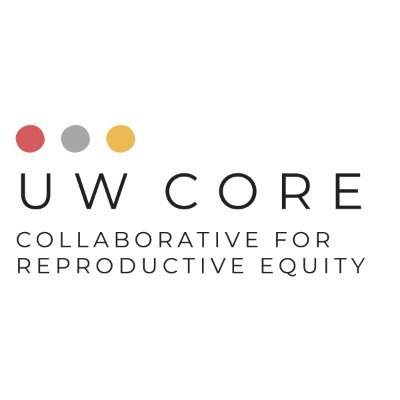
UW Collaborative for Reproductive Equity (CORE)
@WiscCORE
Followers
1K
Following
3K
Media
394
Statuses
2K
Initiative at @UWSMPH that supports rigorous, policy-relevant research on reproductive health, equity, and autonomy in Wisconsin and beyond. Posts≠endorsements.
Madison, WI
Joined February 2021
💬From study: “As reproductive health care access faces growing threats, OTC contraception offers a promising strategy to support reproductive autonomy and reduce disparities in contraceptive use.” ⬆️ community awareness and insurance reimbursement can impact access and autonomy.
0
0
0
The findings also indicate that over-the-counter access could substantially impact contraceptive practices. OTC oral contraceptives led to a: 📈 32% increase in people shifting from no contraception to an FDA-approved method ⬆️ 41% rise from less-effective methods to the OTC pill
1
0
0
New research finds that over-the-counter (OTC) oral contraceptives may improve equitable access 📈 to contraception. 💊 OTC pill users were more likely than prescription users to be uninsured, adolescent, and residents of rural areas. https://t.co/uaX7OKeRJp
#TeachingTuesday
1
0
0
Numerous CORE scholars, along with colleagues from other Wisconsin institutions and communities, will present at the 2025 Society of Family Planning Annual Meeting Oct. 25–27 in Pittsburgh. We look forward to sharing and learning! 📝 🗓️ View the list:
core.wisc.edu
Numerous scholars affiliated with the UW Collaborative for Reproductive Equity, along with colleagues from other Wisconsin institutions and communities, will present at the Society of Family Planning...
0
0
0
📢 @Guttmacher's Megan Kavanaugh, w/ CORE Director Jenny Higgins and others, propose a new method to assess contraceptive access impact, focusing on individual needs and perspectives for better sexual and reproductive health equity. In @ContraceptionJL! ➡️
0
1
2
📢 UW-Madison's Social Science Research Services is coordinating with @uwsoc to hire a communications and events specialist! You'll support the Center for Demography and Ecology and the Center for the Demography of Health and Aging. Apply by Oct. 16 ➡️
0
0
0
⚖️ Current state and federal efforts to restrict medication abortion access threaten this important, safe, and effective health service. ⚠️ In #Wisconsin, state law prohibits telehealth medication abortion care. Read more in our brief ➡️ https://t.co/yylANjITqA
#TeachingTuesday
0
0
0
The 👆 study also suggests that telehealth is addressing gaps in access for underserved populations. People who ordered pills from the telehealth abortion service Aid Access were more likely to live in areas with: 📊 Higher poverty 🛜 Slower internet 🛣️ Longer travel to clinics
1
0
0
Telemedicine 💊 has significantly increased abortion access in the Midwest and South, especially in areas with restrictive laws, a new study shows. 📝 84% of a telemedicine service's prescriptions went to patients in states with significant restrictions. https://t.co/DCDh3CUYgu
1
0
0
A new CORE study links abortion restrictions to higher rates of referrals to child protective services. 🔍 Restrictions result in negative health outcomes, stress, financial strain, and potential family violence, raising child welfare concerns. Read more⬇️
0
0
1
Congratulations to CORE investigator and @widfm's Diana Carvajal and all awardees of new @SocietyFP grants to document the composition of clinicians providing abortion care. Studies will provide evidence to track and strengthen the abortion care workforce.
0
1
2
Planned Parenthood of Wisconsin will pause abortion care at its clinics beginning October 1. This comes as the organization adapts to federal legislation that excludes Medicaid coverage for family planning clinics providing abortion care. More from CORE ⬇️
0
0
1
@ANSIRH @AMJPublicHealth CORE research also documents the impacts on Wisconsinites of restricting abortion access. ⚠️ When abortion clinics in #WI stopped offering services for 15 months post-Dobbs due to an 1849 law, costs of seeking out-of-state abortion care exceeded $1,000. https://t.co/m3UiEJWRZJ
0
0
0
The 👆 findings are from @ANSIRH research in @AMJPublicHealth. https://t.co/4HKlhjySKJ The big picture: "Longer travel times, higher costs, and delays in accessing services are fundamental barriers to care that exacerbate existing reproductive health inequities." #TeachingTuesday
1
0
0
New research underscores how hurdles to abortion access have soared since #Dobbs. Between 2022-24: 💰 Travel costs for abortion ⬆️ from $179 to $372 🕰️ Avg. travel time ⬆️ from 2.8 to 11.3 hours 🌙 Overnight stays ⬆️ from 5% to 58% 📈 Second-trimester abortions ⬆️ from 8% to 17%
1
0
0
The Reproductive Equity Action Lab (REAL) at @WiscObGyn is hiring a full-time research coordinator in Madison, Wisconsin. 📢 This role supports a project on racial disparities in postpartum pain treatment and REAL’s broader research portfolio. Learn more: https://t.co/mCTrh7uQtk
0
1
2
It is essential to understand and address access disparities across sexual identities to provide adequate care.🏥 ℹ️ @DHSWI and Planned Parenthood provide #LGBTQ+ reproductive and sexual health resources in #Wisconsin and beyond: https://t.co/LRw9i6FVOX
https://t.co/gs34fWUOqP
0
0
0
Evidence shows that compared to heterosexual individuals, LGBTQ+ people: 🩺 Have less access to quality reproductive care, leading to higher unintended pregnancy rates 📈 Are more likely to struggle to keep and find medical providers due to abortion bans
1
0
0
Recent research 📝 ( https://t.co/aRXXKklsMf) finds that #LGBTQ+ individuals’ pregnancies are comparatively more likely to end in abortion than heterosexual individuals'. 🚧 The study also documents the barriers LGBTQ+ people face in accessing reproductive care. #TeachingTuesday
1
0
1
A new CORE brief reviews the latest research on the state of abortion in #Wisconsin. ⚖️🔍 🚧 Although the Wisconsin Supreme Court last month rejected the state’s 1849 abortion ban, many other restrictive #WI laws hinder abortion access. 📝Read the brief: https://t.co/2sgG4VW349
0
0
0

